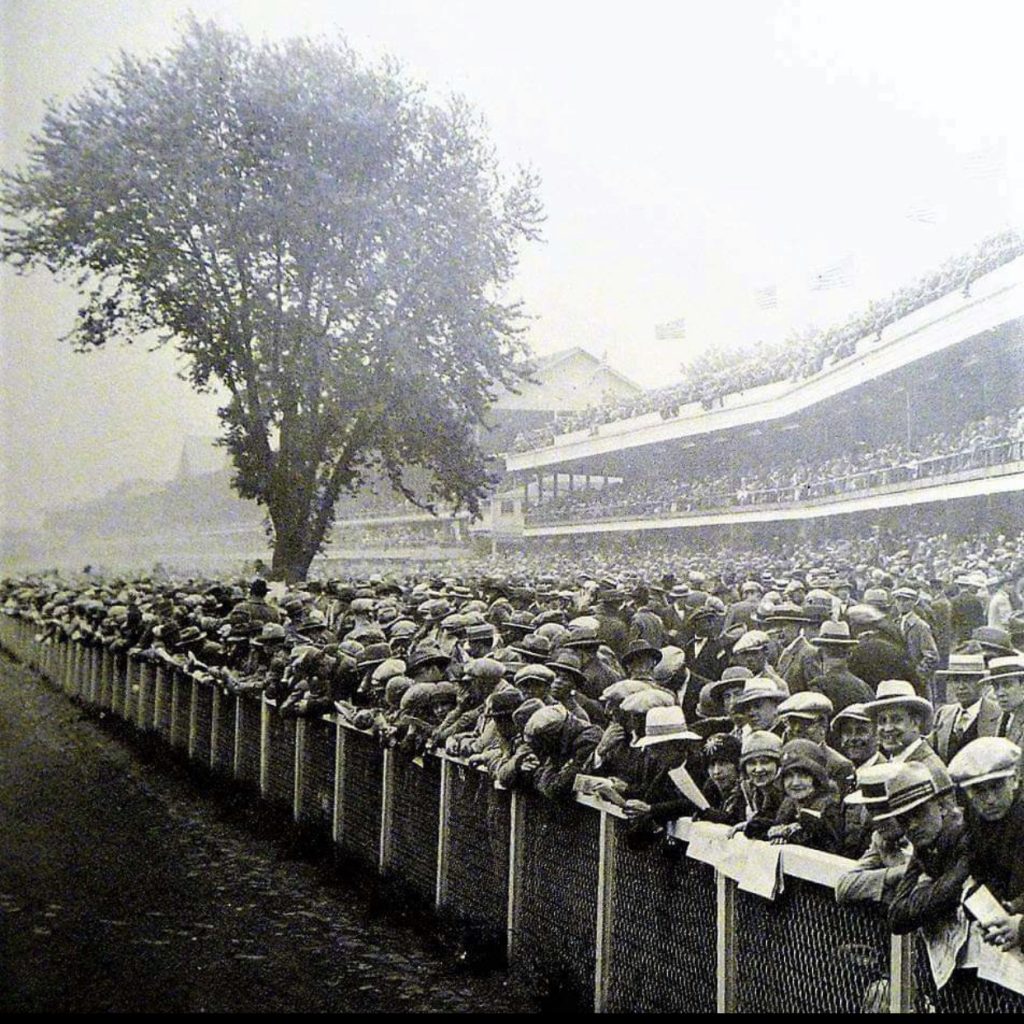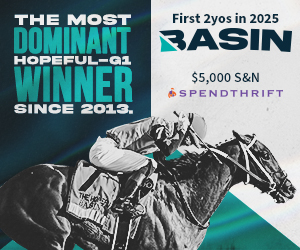
Orson Welles once said of his father Richard H. Welles, “He had a famous name because of a cigar. The ‘Dick Welles’ cigar was a cheap and popular smoke named for a horse which had won the Kentucky Derby. The horse had been named for my father.” The younger Welles, legendary actor and filmmaker that he was, had been orphaned at age 15 so his father’s legacy came at the mercy of the younger Welles’s own remembrances, which had to be taken with a grain of salt. While the cigar part of the memory appears to lack a basis in fact, the horse part is true – to a point.
A Man and His Horse
As a young man, Jerome Respess started out driving a milk wagon, but built his fortune on a variety of ventures, including owning a pool room and a brewery and serving as director of the Peoples-Liberty Bank and Trust Company. In a story that echoes through the sport even now, Respess had fallen in love with horses in his youth. He started out driving and training harness horses, and, much like the path Hall of Fame breeder/owner John E. Madden trod, transitioned from Standardbreds to Thoroughbreds. His stable regularly raced upwards of forty horses while Respess also held stakes in racetracks in Louisiana, Illinois, Kentucky, and Arkansas. His obituary in the Cincinnati Enquirer lists some of the notable horses that passed through Respess’s barn, but the name that sticks out, the one that connected a Kentucky horseman to one of the greats in filmmaking, was a colt named Dick Welles.
Born as America celebrated a new century, Dick Welles (King Eric – Tea’s Over, by Hanover) was a bay colt with two classic winners, Hindoo and Hanover, in his pedigree. His sire King Eric was a stakes winner himself, a contemporary of 19th century greats Tenny and Salvator, and had become enough of a name at stud that Dick Welles’s pedigree drew attention from horsemen as the colt started his racing career in 1902. Bred by Kinzea Stone, noted Kentucky breeder and owner, the yearling Dick Welles was purchased for $250 by John Keating and Paul Hecker, both of whom started out in harness racing in their native Kenosha, Wisconsin. Kenosha was where the man Dick Welles, father of Orson Welles, manufactured bicycle and automobile lamps and frequented men’s clubs in the area, likely meeting either in person or by reputation Keating and Hecker. While Dick Welles the man considered himself a failure because he was not able to build a large fortune, the equine Dick Welles enriched the humans around him, winning plenty while establishing a reputation that would outlive him.
Dick Welles finished third in his first start at Harlem Race Track near Chicago, but his performance in that loss was enough to attract Jerome Respess’s attention. He bought the colt for $4,500 just four days after that first start. The namesake of Richard Welles went on to impress with a record of six wins in ten starts at age two, most at Chicago-area tracks. At three, Dick Welles continued his winning ways, winning 14 of 15 starts that year and setting two American records. The Lexington Herald called the King Eric colt “swiftest thoroughbred ever seen on the American Continent” in 1904. He set records at six furlongs and at a mile, his speed legendary in his time.
His nemesis seemed to be a sloppy track, with most of his losses coming on uncertain footing. Outside of the slop, not even a bad start seemed to keep Dick Welles from sprinting past his competition. On June 30, 1903, Dick Welles faced six others in an allowance race at Washington Park. On a beautiful summer day, the track was fast for this six-furlong dash, the ideal setting for the speedy Dick Welles. Somehow, though, Respess’s colt was turned the wrong way at the start. With the field darting away, jockey Tommy Knight wheeled Dick Welles around and then chased down the others. Despite this near-disastrous start, Dick Welles made up the lost ground, darting to the lead in the race’s waning yards. His meteoric stretch rush set a record of 1:11 4/5 while other clockers timed him as finishing as fast as 1:10 2/5. His official time of 1:11 4/5 was an American record for six furlongs.
Six weeks later, three-year-old Dick Welles faced Grand Opera, a four-year-old, in a match race to decide the best horse in training in the Chicago area. Even though Grand Opera jumped out to an early lead, Dick Welles had no trouble eclipsing the older horse in a handful of strides. Tommy Knight held the colt under wraps until the far turn, when he gave Dick Welles a notch. The long-striding son of King Eric drew even further away from Grand Opera, increasing his lead to five lengths. At this point, Dick Welles’s only competition was the clock, records again falling beneath the quick strikes of this son of King Eric. The time for the mile was 1:37 2/5, another American record. Later that year, Dick Welles was shipped to Latonia for a time trial where he would attempt to better his record time for the mile, a $1,000 purse at stake if he was successful. Rather, as the form chart for the race showed, Dick Welles fell short of his record, but bettered Latonia’s record for the distance by more than a second. That was the last time Dick Welles would be seen under colors on a racetrack.
In the spring of 1904, while the four-year-old colt was being prepared for another season of racing, Dick Welles tried to break loose from his halter and ended up flipping backward, landing on his back. In addition to a shoulder bruise which then turned into an abscess, he also had three broken vertebrae around his withers. When it was clear that Dick Welles was not going to race at age four, Respess supposedly retired the son of the deceased King Eric to stud, but newspapers over the next year or so reported that the owner was attempting to bring the colt back to the track. That comeback never materialized, Respess instead shifting Dick Welles’s energy to stud duty. Even after setting two American records, Dick Welles’s greatest impact on the sport was still to come.
A Horse and His Legacy
While Dick Welles himself did not run in the Kentucky Derby, he did sire two horses that went on to great performances in the Run for the Roses. Jerome Respess bred and owned Wintergreen, the favorite for the 1909 Kentucky Derby. On a wet and chilly Kentucky day that seemed to predict the race’s winner, Wintergreen collided with another horse at the start of the Kentucky Derby, a bump which nearly knocked Wintergreen completely out of contention. Jockey Vincent Powers got the colt back on track, sending him to the lead. This son of Dick Welles scored a wire-to-wire victory, repelling all challengers to take the race in a slow 2:08 1/5. The colt’s win in the 1909 Kentucky Derby was his only career stakes victory. In 1914, while racing for a different owner, Wintergreen was among eight horses that died in a barn fire at Latonia.
For modern racing fans, Dick Welles is best known as the sire of Billy Kelly, Hall of Fame sprinter and stablemate of Sir Barton, America’s first Triple Crown winner. Respess bred the bay gelding and then sold him to trainer William Perkins. The next year, W.F. Polson purchased Billy Kelly from Perkins, racing the gelding in his colors until August 1918. After Billy Kelly reeled off a series of sensational victories that month, Commander John Kenneth Leveson Ross paid $27,500 to Polson for the hardy sprinter. In October, Billy Kelly and rival Eternal met at Laurel for a match race to decide the two-year-old championship, with Eternal winning by a head. That close loss whetted Ross’s appetite for a rematch, this time in the Kentucky Derby.
That winter, Commander Ross was offered another incentive for matching Billy Kelly with Eternal in the Derby: a wager with the notorious gambler Arnold Rothstein for $50,000. If Billy Kelly finished ahead of Eternal, Ross would win; if Eternal beat Billy Kelly, Rothstein would collect the money from Ross. Commander Ross entered Billy Kelly, son of Dick Welles who had already sired one Derby winner, in the 1919 Kentucky Derby, with his eye on both avenging the gelding’s defeat at the hands of Eternal and bringing home a win in the country’s most prestigious race. Eager to ensure that his stable would bring home the roses, Ross also entered Sir Barton, who had beaten Billy Kelly in workouts prior to the Derby; both horses had the speed and the talent to win, but Dick Welles had been a sprinter and doubts reigned about his son’s ability to win at a mile and a quarter. In the end, Billy Kelly would finish ahead of Eternal, winning Ross’s bet with Rothstein, but came in second to Sir Barton, the first time that two horses from the same stable finished one-two in the Kentucky Derby. Sir Barton would go on to add the Preakness Stakes and the Belmont Stakes to his Derby victory, completing America’s first Triple Crown.
In his career, Billy Kelly, Dick Welles’s best son, won or finished in the money in 63 of his 69 starts over his six seasons, often in handicaps where he would carry 130 pounds or more. Like his sire, Billy Kelly was a consistent at sprint distances, often beating horses like Sir Barton, Exterminator, and others. Upon his death in 1926, Ross erected a memorial to his hardy sprinter on his farm outside of Montreal, commemorating Billy Kelly and all he brought to the Ross Stable in his long career.
After the stallion’s death in 1923, Jerome Respess honored Dick Welles with a grave befitting his role in the horseman’s career. Buried on Respess’s Highland Stock Farm in Boone County, Kentucky, Dick Welles’s memorial included a concrete headstone with an inscription detailing the horse’s accomplishments, a ring of stones to commemorate where Dick Welles rested, and a profusion of irises in purple and white, Respess’s colors. Over the last century, the land that was Highland Stock Farm has become part of the Northern Kentucky Industrial Park, its history as the home of a record holder named for Orson Welles’s father left behind long ago. As for Dick Welles’s memorial, its whereabouts continue to be shrouded in uncertainty, its precise location still unknown.
Over a century later, we remember Dick Welles, a superstar named for the father of a Hollywood legend and the sire of a champion sprinter who also happened to be the stablemate of the legend who pioneered the Triple Crown.
Jennifer Kelly



